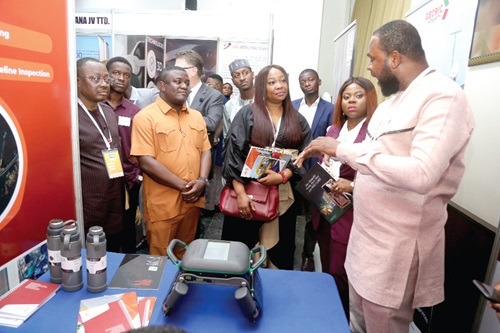Stakeholders in the oil and gas industry have been encouraged to adopt innovative pricing and decarbonisation strategies to drive Africa’s energy transition.
Innovative pricing for gas must take into account cost components such as commodity cost, tariffs, levies and fees. The Chief Executive Officer (CEO) of Ghana Gas, Dr Ben Asante, who made the call, also suggested moving away from global gas pricing and adopting a more localised approach.
At the second Society of Petroleum Engineers (SPE) Ghana Biennial International Summit and Exhibition 2024, Dr Asante, who is the board chair of SPE Ghana, emphasised the need for a more attractive pricing regime for energy products, particularly for small to medium-sized industries.
Impact of innovation
The two-day event, on the theme: “Embracing innovation, redefining the future of the oil and gas industry in Africa”, brought together stakeholders to discuss innovation, sustainability and energy transition in Africa.
Africa is home to five of the top 30 oil-producing countries in the world and holds over 125 billion barrels of proven oil reserves. However, the continent faces significant challenges in harnessing these resources effectively and sustainably.
The impact of innovation on the African oil and gas industry is significant, bringing benefits such as enhanced operational efficiency, cost reduction, safety improvements, economic growth and job creation.
Challenges
Dr Asante stated that the challenges facing Africa’s energy sector included inadequate infrastructure and unclear institutional frameworks, and proposed solutions such as building intellectual capital, encouraging private sector participation and prudent management of resource revenues.
He stressed the importance of reliable and sustainable commodity supply, appropriate balance between local and export markets and minimising costs. On Ghana’s decarbonisation journey, Dr Asante called for the need for a long-term energy transition plan.
He highlighted Ghana Gas’ effort to build intellectual capital and promote local participation in the energy sector.
Inclusive progress
The Section Director of SPE Ghana, Dr Riverson Oppong, noted that the industry was undergoing significant transformation, and innovation was no longer a choice, but a necessity for survival and growth.
He mentioned a number of innovative technologies employed in the industry, including the Cora-South FlNG project in Mozambique, the Mozambique LNG project led by Total Energies, and seismic surveys in Ghana.
Dr Oppong also stated the importance of prioritising safety through innovation, particularly in challenging environment such as deep-sea drilling off the African Coast. Collaboration within organisations, he said, had helped develop advanced monitoring system that had significantly improved safety standards.
Dr Oppong emphasised the importance of ensuring that progress was inclusive and benefited all stakeholders, including local communities and future generations.
Ghana’s commitment
The Deputy Minister of Energy, Collins Adomako-Mensah, stressed that embracing innovation was crucial to redefining the future of the industry and ensuring sustainable development.
He highlighted Ghana’s commitment to promoting sustainable change in the energy sector, with a focus on local content and capacity building. Mr Adomako-Mensah noted that Ghana had made significant strides in the oil and gas sector, with oil and gas contributing 4.5 per cent of GDP on average from 2013 to 2021.
He also acknowledged the importance of innovation in driving the industry’s survival and growth, citing advancements in automation, artificial intelligence and renewable energy sources.
The deputy minister emphasised the need for intergenerational collaboration, leveraging the experience of seasoned professionals and the fresh perspective of younger colleagues to drive innovation.
Exhibition
A number of companies in the industry displayed their innovations during the exhibition. They include Ghana National Petroleum Corporation, Petroleum Commission Ghana, Rigworld Solutions Limited, SLB, Modec Production Services Ghana, Ghana National Gas LTD. Co., GECRIX Asset Integrity Management Limited.


